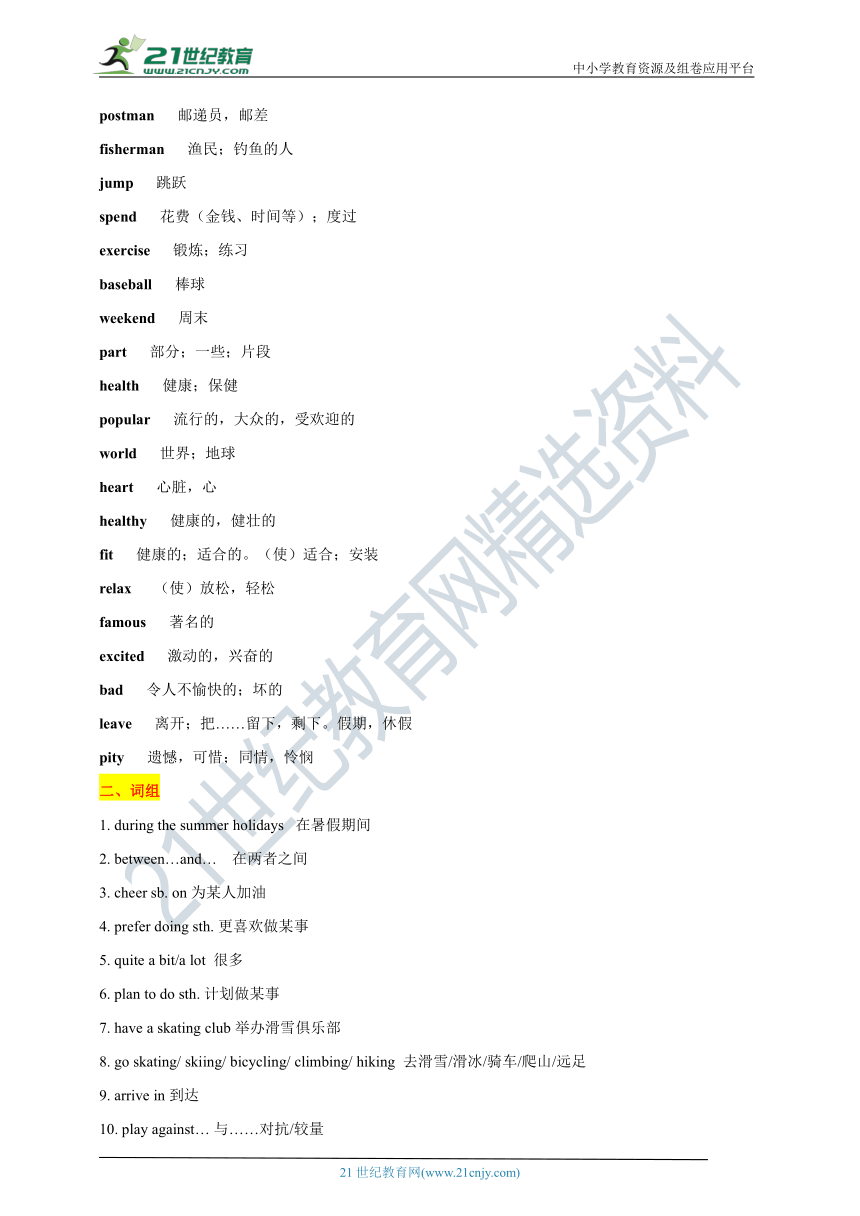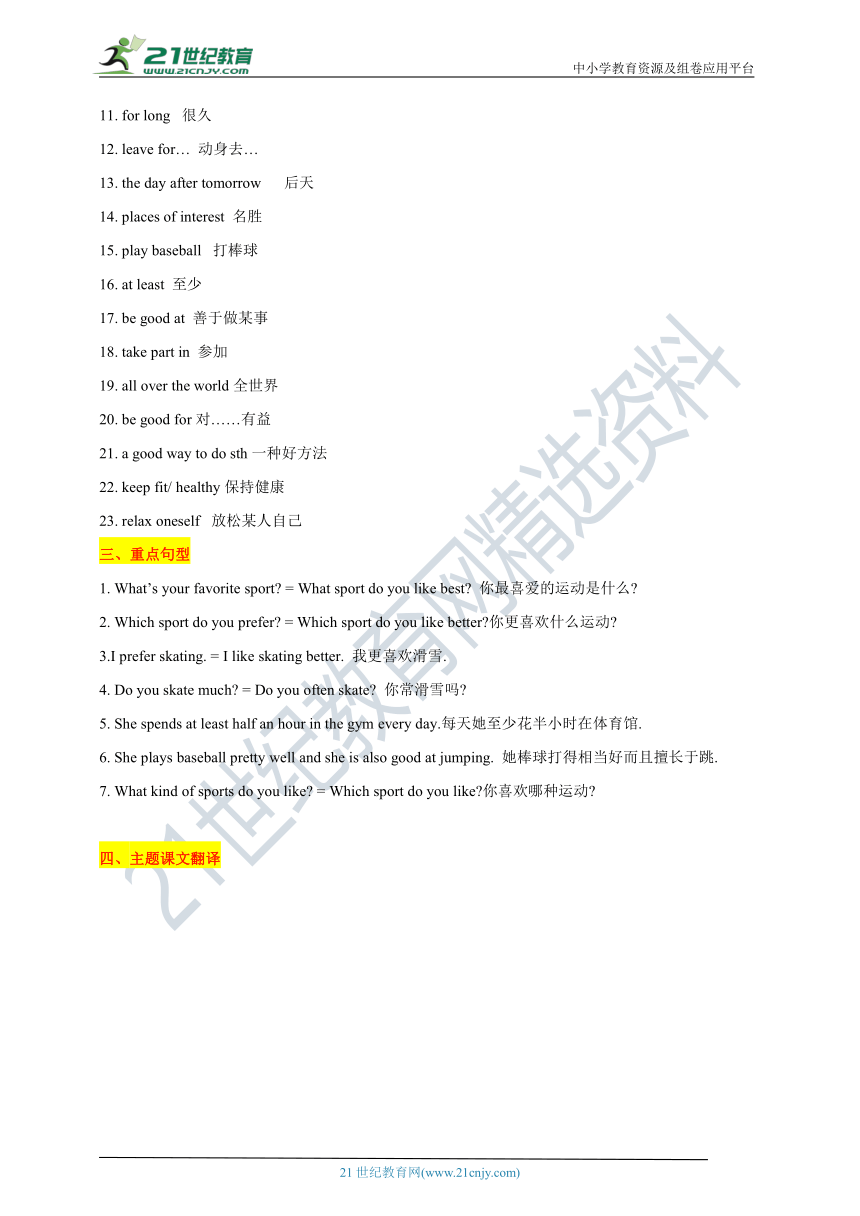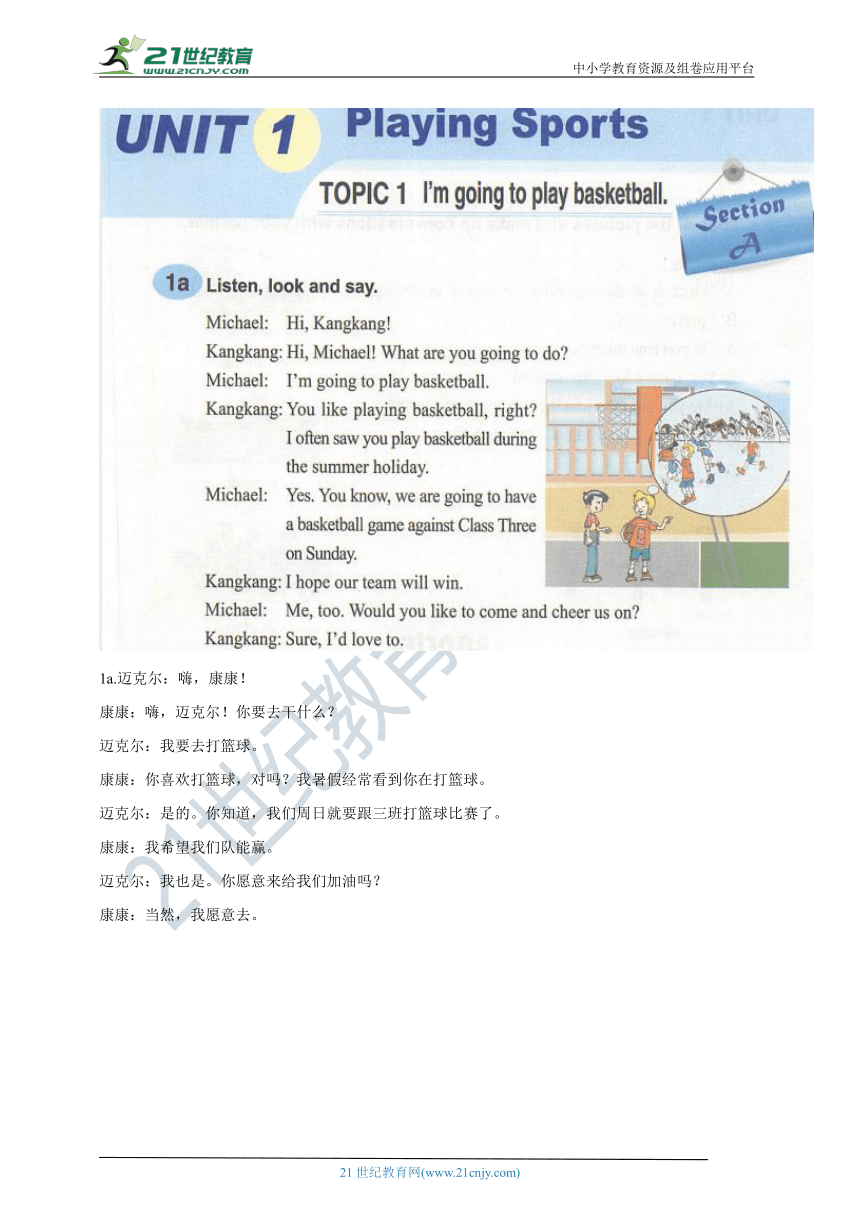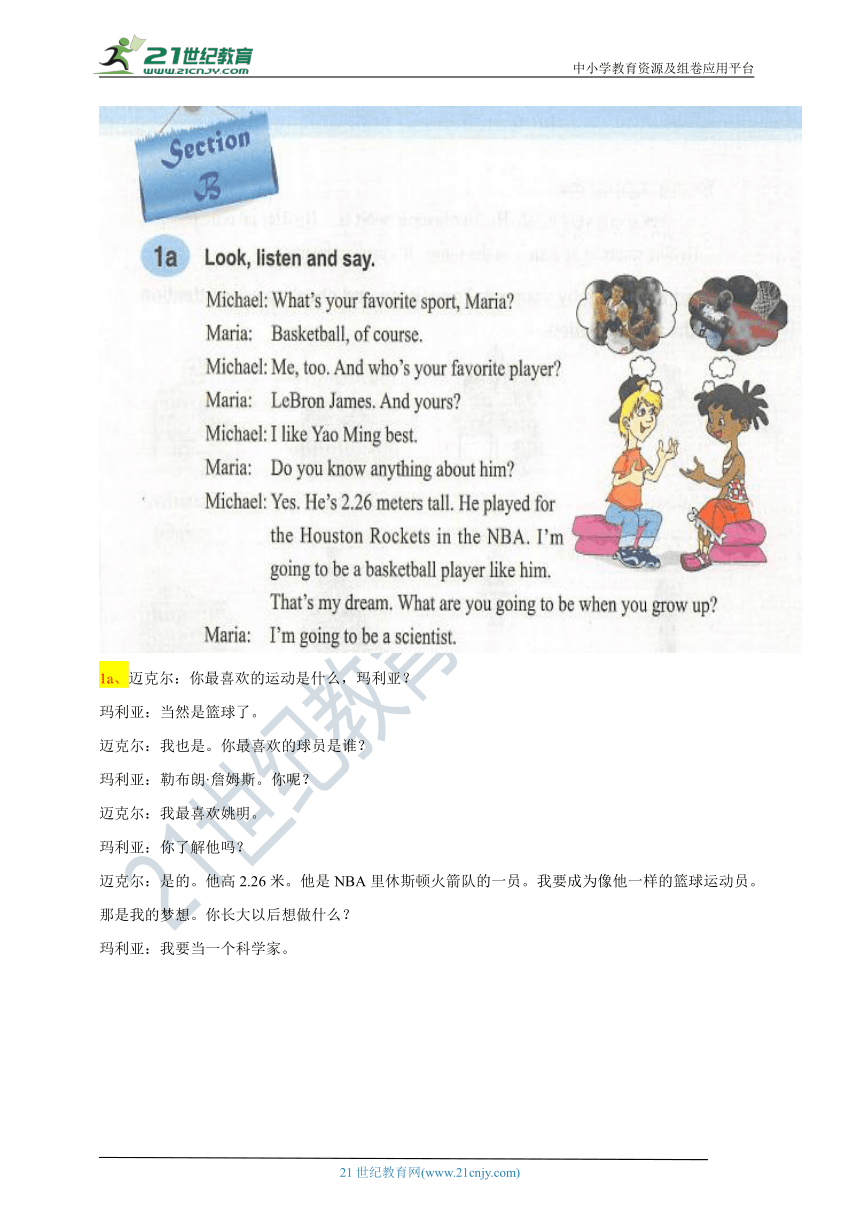U1 Topic 1 I’m going to play basketball.同步课堂
文档属性
| 名称 | U1 Topic 1 I’m going to play basketball.同步课堂 |

|
|
| 格式 | doc | ||
| 文件大小 | 1.6MB | ||
| 资源类型 | 试卷 | ||
| 版本资源 | 仁爱科普版 | ||
| 科目 | 英语 | ||
| 更新时间 | 2021-08-04 00:00:00 | ||
图片预览





文档简介
中小学教育资源及组卷应用平台
同步课堂 仁爱版八年级英语上
Unit 1 Playing Sports
Topic 1 I’m going to play basketball.
一、重点词语
(一)词形
1. almost(反义词)never 2.win(过去式)won(名词)winner?
3.ski(现在分词)skiing 4.famous(比较级)more famous
5.arrive(同义词)reach? 6.leave(过去式))left?
7.popular(最高级)most popular 8.healthy(同义词)fit(名词)health
(二)词汇
during 在……期间
against 对着;反对
team 队,组
win 获胜,赢得
cheer 加油;欢呼,喝彩。欢呼声,喝彩声
practice 练习;实践
row 划(船)。一排,一行
quite 相当,很,十分
join 加入,参加;连接
skate 溜冰,滑冰;滑(滑板)
tennis 网球
player 运动员;比赛者,选手
dream 梦想;梦。做梦
grow 成长,生长;发育;种植;变成
scientist 科学家
future 将来
musician 乐手,音乐家,乐师
pilot 飞行员;驾驶员
policeman 男警察
policewoman 女警察
postman 邮递员,邮差
fisherman 渔民;钓鱼的人
jump 跳跃
spend 花费(金钱、时间等);度过
exercise 锻炼;练习
baseball 棒球
weekend 周末
part 部分;一些;片段
health 健康;保健
popular 流行的,大众的,受欢迎的
world 世界;地球
heart 心脏,心
healthy 健康的,健壮的
fit 健康的;适合的。(使)适合;安装
relax (使)放松,轻松
famous 著名的
excited 激动的,兴奋的
bad 令人不愉快的;坏的
leave 离开;把……留下,剩下。假期,休假
pity 遗憾,可惜;同情,怜悯
二、词组
1. during the summer holidays? 在暑假期间
2. between…and…?? 在两者之间
3. cheer sb. on?为某人加油
4. prefer doing sth.?更喜欢做某事
5. quite a bit/a lot??很多
6. plan to do sth.?计划做某事
7. have a skating club?举办滑雪俱乐部
8. go skating/ skiing/ bicycling/ climbing/ hiking??去滑雪/滑冰/骑车/爬山/远足
9. arrive in?到达
10. play against…?与……对抗/较量
11. for long???很久
12. leave for…??动身去…
13. the day after tomorrow???? 后天
14. places of interest??名胜
15. play baseball???打棒球
16. at least??至少
17. be good at??善于做某事
18. take part in??参加
19. all over the world?全世界
20. be good for?对……有益
21. a good way to do sth一种好方法
22. keep fit/ healthy?保持健康
23. relax oneself? 放松某人自己
三、重点句型
1. What’s your favorite sport? = What sport do you like best? 你最喜爱的运动是什么?
2. Which sport do you prefer? = Which sport do you like better?你更喜欢什么运动?
3.I prefer skating. = I like skating better. 我更喜欢滑雪.
4. Do you skate much? = Do you often skate? 你常滑雪吗?
5. She spends at least half an hour in the gym every day.每天她至少花半小时在体育馆.
6. She plays baseball pretty well and she is also good at jumping. 她棒球打得相当好而且擅长于跳.
7. What kind of sports do you like? = Which sport do you like?你喜欢哪种运动?
四、主题课文翻译
1a.迈克尔:嗨,康康!
康康:嗨,迈克尔!你要去干什么?
迈克尔:我要去打篮球。
康康:你喜欢打篮球,对吗?我暑假经常看到你在打篮球。
迈克尔:是的。你知道,我们周日就要跟三班打篮球比赛了。
康康:我希望我们队能赢。
迈克尔:我也是。你愿意来给我们加油吗?
康康:当然,我愿意去。
1a、迈克尔:你最喜欢的运动是什么,玛利亚?
玛利亚:当然是篮球了。
迈克尔:我也是。你最喜欢的球员是谁?
玛利亚:勒布朗·詹姆斯。你呢?
迈克尔:我最喜欢姚明。
玛利亚:你了解他吗?
迈克尔:是的。他高2.26米。他是NBA里休斯顿火箭队的一员。我要成为像他一样的篮球运动员。那是我的梦想。你长大以后想做什么?
玛利亚:我要当一个科学家。
1a、安非常喜欢运动。她每周去骑两次自行车,而且周日经常去爬山。她每天都会在健身房锻炼半个小时。她每周六学习打棒球,现在她打的非常好。她也很擅长跳远。下周末学校要开运动会。她会参加跳高和跳远。她的同班同学会去给她加油。他们很确定安一定会赢。
Section D
1a. 在过去的20年里,贝克汉姆是一位非常著名的足球运动员。他曾效力于英格兰、西班牙、美国和意大利的球队。他昨天和他的队友们到达了北京。他们明天要和中国国家队比赛。足球迷们非常兴奋。但可惜的是,这支球队不会待太久。他们后天将启程前往日本,与日本国家队进行一场比赛。
五、重点语言点
Section A
1.I saw you play basketball almost every day during the Summer holidays.
常见的感官动词有:see, watch, hear, smell(嗅觉), feel 等。后可接①动词ing形式,表此动作正在发生。②动词原形,不表此动作正在发生, 表此动作已完成或存在的事实。
① Do you smell something ? (burn) 答案:burning
② I often see him basketball after class. ( play ) 答案:play
2.There is going to be a basketball game between Class Three and our class this Sunday.
There be 句型:表某地有某物. 而have 表示某人有…
(1)There is/ are..表现在某地有某物,is/are取决于后面的名词是单数还是复数,单数用is复数用are,如①There is a pen and two rulers on the desk.②There are two rulers and a pen…
(2) There was/were…表过去某地有某物。was/were的用法也遵循就近原则。
(3)There will be 或 There is/are going to be 表某地将有某事物。不能说成 There will have…
(题) a match in our school between Class Three and Class Four next week.
3.Would you like to come and cheer us on? ----- Sure, I’d love to.
(1)Would you like + 不定式? 表建议或邀请。常用I’d love to 来回答,不同意也常用 “I’d love to, but… ”来拒绝别人。如:Would you like to play basketball with me ?--- I’d love to, but I have a lot of homework to do.
(2)在肯定句中 would like= want 如:I’d like to have a rest. = I want to have a rest.
4. I hope our team will win.---- Me , too.(= So do I.)
① hope + that从句,that 可省去。I hope that I can see you soon.
② hope to do sth. I hope to see you soon.
注意: (1)wish(愿)与hope的用法一样,后既可以接从句也可以接不定式,但不能说hope sb. to do sth. (hope 后不接双宾语, 但wish可以),如:
I hope you to help me (错) I hope that you can help me.(对)
(2)hope 后接的从句常用将来时态表可以实现的愿望,而wish 后接的宾语从句常用过去时态表难以实现的愿望,如:
①I hope you will come. ②I wish I could fly to the moon.
5. I prefer rowing.
(1)prefer(过去式\过去分词需双写 preferred) 后可直接接动词ing形式或动词不定式, 表更喜欢…, 用法同like/ love:
①I prefer swimming (更喜欢经常游泳) ②I prefer to swim.(更喜欢这一次去游泳)
(2)prefer (doing) A to (doing) B 相当于:like… better than…
I prefer swimming to skating. ==I like swimming better than skating.
(3) 后接不定式时与rather(在一定能够程度上,颇) than 或instead of连用,如:
He preferred to die rather than (to) steal./ He preferred to die instead of stealing.他宁死也不去偷窃。
6. -----Do you row much ?你经常划船吗?----- Yes , quite a bit / a lot. 是的,经常。
quite a bit/ a lot 经常/许多,大量. ①quite a bit of 后接不可数名词,如:quite a bit of money。②quite a lot of 后既可接可数名词复数也可以接不可数名词,如:quite a lot of books/ information。而③quite a few=many 表“相当多”后接可数名词复数,如:quite a few students④quite a little =much表许多,后接不可数名词,如; quite a little money ⑤very few / little 很少很少。
7.Are you going to join the school rowing club?
①join 加入(人群,组织) ②take part in 参加(活动,比赛)
注意:(1)join可与in连用,后接活动,即 take part in=join in = be in后都接活动。如:①He joined in the game ;②He joined in helping the old man. ③I’ll be in the relay race. (2) Join sb. in doing sth. 表加入某人的活动。 如:Will you join us in playing basketball ?
Section B
1.How tall is he, do you know?----- Yes. He is 2.26 meters tall.
与how构成的疑问词有:How tall(身高)多高; how high(山)多高;how heavy多重;how long 多长;How wide 多宽;how deep 多深;how old 多大…. 对应的回答常用“数词+量词+形容词”,如:
1.70 meters tall; 2 kilometers high; 3 kilos heavy; 20 years old
2.They both play for the Houston Rockets in the NBA.
play for 为某个队效力;play against 与某个队比赛;play with 玩某物/与某人玩 (比较:play basketball 打篮球;Look, the baby is playing with a basketball (玩弄一个篮球)
3. what are you going to be when you grow up ?= what do you want to be …?你长大想干什么?
4. David Beckham, a famous soccer star, arrived in Beijing with his team yesterday.
表到达的有:①arrive at + (小地名);arrive in +(大地名)② get to ③ reach
5. The fans are very excited.
(1)excited 表“感到激动的、兴奋的”,常只作表语,主语常为人。如:We are excited.
类似的有:interested有趣的; tired感到疲劳的; bored感到厌烦的
(2)exciting 表“令人激动兴奋的”既可作定语,也可作表语;作表语时,主语常为事物,如:①an interesting book; ②The book is interesting.
类似的有:interesting令人有趣的; tiring令人感到疲劳的; boring令人感到厌烦的
6. It’s too bad that they aren’t going to stay in Beijing for long.
主语是斜体that从句部分,前用it 来代替它。因此这是一个含主语从句的复合句。
It’s too bad that…= It’s a pity that…= It’s a shame that..很遗憾…..
7. 在英语中有一些表示位置移动的词,如:go,come,leave, arrive, fly 可用现在进行时态表将来。如:
They are flying to Wuhan tomorrow. (表将飞往武汉而不是正去武汉)
They are leaving for Japan.= They will leave for Japan.
8. Zhang Yining, one of the world’s best women table tennis players, won two gold medals for China.
(1)one of 表… 中的一个,后接可数名词的复数,如:one of my friends
(2)名词作定语修饰名词时,一般用单数形式,如:two book shops, two shoe shops, 但man,woman,sports修饰可数名词复数时,常用复数形式,如:two men teachers; sports meet
(3)win a gold medal赢得一枚金牌; win a prize 赢得奖品; win the first place 赢得第一名
9. What a shame != What a pity 多么遗憾!
类似的有:What fun ! 多么有趣!
10. break the record 打破纪录;keep the record 保持纪录
11. Please write back soon.请快点写回信。 write back 回信
Section C
1. once a week, 一周一次twice a week一周两次, 三次或三次以上用“数字+times”如:
Three times a year, four times a day, five times a week,…..
2. go + v-ing形式的短语表“去做某事”如:go hiking 去徒步旅行,go shopping去购物, go skating 去滑冰,go skiing 去滑雪;go fishing 去钓鱼。
3. she spends half an hour doing exercise in the gym every day.
当exercise指“体操、练习”时,是可数名词,如:do morning exercises 做早操;do English exercises 做英语练习题;但exercise指“锻炼,运动”时,是不可数名词。如:do exercise 做运动。exercise 还可作动词,指“锻炼,运动”如:She exercises every morning.
4. She plays it pretty well. pretty well= very well相当好
5. She is also good at jumping.
be good at…= do well in…擅长… 如:I am good at English.= I do well in English.
be good for… 对…有好处,Running is good for your health.
反义词为:be bad at= do badly in 不擅长…. be bad for 对… 有害
类似短语:be good/bad to sb. 对某人好/不好
6. They are sure that she will win.
①be sure +(that)从句,表“确信…” 如:I’m sure (that) eating too much is bad for you.
②be sure to do sth..确信做某事We are sure to win next time.
③be sure of/about (doing)sth. 表确信(做)某事 I’m sure of that.
7. How often does she go cycling ?
(1)go +动词ing形式,表进行某种户外活动,如:go swimming, go fishing, go climbing.
(2)How often问多久一次,频率。常用sometimes, seldom, twice a year等回答。
How long 问多久。常用“(For)一段时间”来回答
How soon 问多快(时间),用于将来时态。常用“In an hour 在一小时内等”来回答。如:
How soon will you come back? -----In a week.
与how搭配的疑问词有:①How many 多少(接可数名词复数形式)②How much 多少(接不可数名词)
③How old 问年龄④How tall 多高(人、树)⑤How high 多高(山、楼)⑥How far 问距离 ⑦ How long
还可以问物体的长度
(1) is it from your home to your school?------It’s two kilometers away.
(2) is the room?------ It’s two meters wide.
(3) is the tree? -------It’s three meters high.
8. Because it makes me strong and it is popular all over the world.因为它使我强壮并且它流行
make, let , have 当表“使,让”时是使令动词,后接动词原形。如:make me cry
make 后还可以接形容词,名词,如: make me strong, make him our monitor ,
9. keep healthy = keep fit 保持健康(healthy=fit都是形容词,health 是名词)
Section D
1. Have a good day! 祝你今天玩得高兴
Have a good journey! 旅途愉快
Have a good time! 祝你过得愉快
Have a good weekend! 周末愉快
_21?????????è?????(www.21cnjy.com)_
同步课堂 仁爱版八年级英语上
Unit 1 Playing Sports
Topic 1 I’m going to play basketball.
一、重点词语
(一)词形
1. almost(反义词)never 2.win(过去式)won(名词)winner?
3.ski(现在分词)skiing 4.famous(比较级)more famous
5.arrive(同义词)reach? 6.leave(过去式))left?
7.popular(最高级)most popular 8.healthy(同义词)fit(名词)health
(二)词汇
during 在……期间
against 对着;反对
team 队,组
win 获胜,赢得
cheer 加油;欢呼,喝彩。欢呼声,喝彩声
practice 练习;实践
row 划(船)。一排,一行
quite 相当,很,十分
join 加入,参加;连接
skate 溜冰,滑冰;滑(滑板)
tennis 网球
player 运动员;比赛者,选手
dream 梦想;梦。做梦
grow 成长,生长;发育;种植;变成
scientist 科学家
future 将来
musician 乐手,音乐家,乐师
pilot 飞行员;驾驶员
policeman 男警察
policewoman 女警察
postman 邮递员,邮差
fisherman 渔民;钓鱼的人
jump 跳跃
spend 花费(金钱、时间等);度过
exercise 锻炼;练习
baseball 棒球
weekend 周末
part 部分;一些;片段
health 健康;保健
popular 流行的,大众的,受欢迎的
world 世界;地球
heart 心脏,心
healthy 健康的,健壮的
fit 健康的;适合的。(使)适合;安装
relax (使)放松,轻松
famous 著名的
excited 激动的,兴奋的
bad 令人不愉快的;坏的
leave 离开;把……留下,剩下。假期,休假
pity 遗憾,可惜;同情,怜悯
二、词组
1. during the summer holidays? 在暑假期间
2. between…and…?? 在两者之间
3. cheer sb. on?为某人加油
4. prefer doing sth.?更喜欢做某事
5. quite a bit/a lot??很多
6. plan to do sth.?计划做某事
7. have a skating club?举办滑雪俱乐部
8. go skating/ skiing/ bicycling/ climbing/ hiking??去滑雪/滑冰/骑车/爬山/远足
9. arrive in?到达
10. play against…?与……对抗/较量
11. for long???很久
12. leave for…??动身去…
13. the day after tomorrow???? 后天
14. places of interest??名胜
15. play baseball???打棒球
16. at least??至少
17. be good at??善于做某事
18. take part in??参加
19. all over the world?全世界
20. be good for?对……有益
21. a good way to do sth一种好方法
22. keep fit/ healthy?保持健康
23. relax oneself? 放松某人自己
三、重点句型
1. What’s your favorite sport? = What sport do you like best? 你最喜爱的运动是什么?
2. Which sport do you prefer? = Which sport do you like better?你更喜欢什么运动?
3.I prefer skating. = I like skating better. 我更喜欢滑雪.
4. Do you skate much? = Do you often skate? 你常滑雪吗?
5. She spends at least half an hour in the gym every day.每天她至少花半小时在体育馆.
6. She plays baseball pretty well and she is also good at jumping. 她棒球打得相当好而且擅长于跳.
7. What kind of sports do you like? = Which sport do you like?你喜欢哪种运动?
四、主题课文翻译
1a.迈克尔:嗨,康康!
康康:嗨,迈克尔!你要去干什么?
迈克尔:我要去打篮球。
康康:你喜欢打篮球,对吗?我暑假经常看到你在打篮球。
迈克尔:是的。你知道,我们周日就要跟三班打篮球比赛了。
康康:我希望我们队能赢。
迈克尔:我也是。你愿意来给我们加油吗?
康康:当然,我愿意去。
1a、迈克尔:你最喜欢的运动是什么,玛利亚?
玛利亚:当然是篮球了。
迈克尔:我也是。你最喜欢的球员是谁?
玛利亚:勒布朗·詹姆斯。你呢?
迈克尔:我最喜欢姚明。
玛利亚:你了解他吗?
迈克尔:是的。他高2.26米。他是NBA里休斯顿火箭队的一员。我要成为像他一样的篮球运动员。那是我的梦想。你长大以后想做什么?
玛利亚:我要当一个科学家。
1a、安非常喜欢运动。她每周去骑两次自行车,而且周日经常去爬山。她每天都会在健身房锻炼半个小时。她每周六学习打棒球,现在她打的非常好。她也很擅长跳远。下周末学校要开运动会。她会参加跳高和跳远。她的同班同学会去给她加油。他们很确定安一定会赢。
Section D
1a. 在过去的20年里,贝克汉姆是一位非常著名的足球运动员。他曾效力于英格兰、西班牙、美国和意大利的球队。他昨天和他的队友们到达了北京。他们明天要和中国国家队比赛。足球迷们非常兴奋。但可惜的是,这支球队不会待太久。他们后天将启程前往日本,与日本国家队进行一场比赛。
五、重点语言点
Section A
1.I saw you play basketball almost every day during the Summer holidays.
常见的感官动词有:see, watch, hear, smell(嗅觉), feel 等。后可接①动词ing形式,表此动作正在发生。②动词原形,不表此动作正在发生, 表此动作已完成或存在的事实。
① Do you smell something ? (burn) 答案:burning
② I often see him basketball after class. ( play ) 答案:play
2.There is going to be a basketball game between Class Three and our class this Sunday.
There be 句型:表某地有某物. 而have 表示某人有…
(1)There is/ are..表现在某地有某物,is/are取决于后面的名词是单数还是复数,单数用is复数用are,如①There is a pen and two rulers on the desk.②There are two rulers and a pen…
(2) There was/were…表过去某地有某物。was/were的用法也遵循就近原则。
(3)There will be 或 There is/are going to be 表某地将有某事物。不能说成 There will have…
(题) a match in our school between Class Three and Class Four next week.
3.Would you like to come and cheer us on? ----- Sure, I’d love to.
(1)Would you like + 不定式? 表建议或邀请。常用I’d love to 来回答,不同意也常用 “I’d love to, but… ”来拒绝别人。如:Would you like to play basketball with me ?--- I’d love to, but I have a lot of homework to do.
(2)在肯定句中 would like= want 如:I’d like to have a rest. = I want to have a rest.
4. I hope our team will win.---- Me , too.(= So do I.)
① hope + that从句,that 可省去。I hope that I can see you soon.
② hope to do sth. I hope to see you soon.
注意: (1)wish(愿)与hope的用法一样,后既可以接从句也可以接不定式,但不能说hope sb. to do sth. (hope 后不接双宾语, 但wish可以),如:
I hope you to help me (错) I hope that you can help me.(对)
(2)hope 后接的从句常用将来时态表可以实现的愿望,而wish 后接的宾语从句常用过去时态表难以实现的愿望,如:
①I hope you will come. ②I wish I could fly to the moon.
5. I prefer rowing.
(1)prefer(过去式\过去分词需双写 preferred) 后可直接接动词ing形式或动词不定式, 表更喜欢…, 用法同like/ love:
①I prefer swimming (更喜欢经常游泳) ②I prefer to swim.(更喜欢这一次去游泳)
(2)prefer (doing) A to (doing) B 相当于:like… better than…
I prefer swimming to skating. ==I like swimming better than skating.
(3) 后接不定式时与rather(在一定能够程度上,颇) than 或instead of连用,如:
He preferred to die rather than (to) steal./ He preferred to die instead of stealing.他宁死也不去偷窃。
6. -----Do you row much ?你经常划船吗?----- Yes , quite a bit / a lot. 是的,经常。
quite a bit/ a lot 经常/许多,大量. ①quite a bit of 后接不可数名词,如:quite a bit of money。②quite a lot of 后既可接可数名词复数也可以接不可数名词,如:quite a lot of books/ information。而③quite a few=many 表“相当多”后接可数名词复数,如:quite a few students④quite a little =much表许多,后接不可数名词,如; quite a little money ⑤very few / little 很少很少。
7.Are you going to join the school rowing club?
①join 加入(人群,组织) ②take part in 参加(活动,比赛)
注意:(1)join可与in连用,后接活动,即 take part in=join in = be in后都接活动。如:①He joined in the game ;②He joined in helping the old man. ③I’ll be in the relay race. (2) Join sb. in doing sth. 表加入某人的活动。 如:Will you join us in playing basketball ?
Section B
1.How tall is he, do you know?----- Yes. He is 2.26 meters tall.
与how构成的疑问词有:How tall(身高)多高; how high(山)多高;how heavy多重;how long 多长;How wide 多宽;how deep 多深;how old 多大…. 对应的回答常用“数词+量词+形容词”,如:
1.70 meters tall; 2 kilometers high; 3 kilos heavy; 20 years old
2.They both play for the Houston Rockets in the NBA.
play for 为某个队效力;play against 与某个队比赛;play with 玩某物/与某人玩 (比较:play basketball 打篮球;Look, the baby is playing with a basketball (玩弄一个篮球)
3. what are you going to be when you grow up ?= what do you want to be …?你长大想干什么?
4. David Beckham, a famous soccer star, arrived in Beijing with his team yesterday.
表到达的有:①arrive at + (小地名);arrive in +(大地名)② get to ③ reach
5. The fans are very excited.
(1)excited 表“感到激动的、兴奋的”,常只作表语,主语常为人。如:We are excited.
类似的有:interested有趣的; tired感到疲劳的; bored感到厌烦的
(2)exciting 表“令人激动兴奋的”既可作定语,也可作表语;作表语时,主语常为事物,如:①an interesting book; ②The book is interesting.
类似的有:interesting令人有趣的; tiring令人感到疲劳的; boring令人感到厌烦的
6. It’s too bad that they aren’t going to stay in Beijing for long.
主语是斜体that从句部分,前用it 来代替它。因此这是一个含主语从句的复合句。
It’s too bad that…= It’s a pity that…= It’s a shame that..很遗憾…..
7. 在英语中有一些表示位置移动的词,如:go,come,leave, arrive, fly 可用现在进行时态表将来。如:
They are flying to Wuhan tomorrow. (表将飞往武汉而不是正去武汉)
They are leaving for Japan.= They will leave for Japan.
8. Zhang Yining, one of the world’s best women table tennis players, won two gold medals for China.
(1)one of 表… 中的一个,后接可数名词的复数,如:one of my friends
(2)名词作定语修饰名词时,一般用单数形式,如:two book shops, two shoe shops, 但man,woman,sports修饰可数名词复数时,常用复数形式,如:two men teachers; sports meet
(3)win a gold medal赢得一枚金牌; win a prize 赢得奖品; win the first place 赢得第一名
9. What a shame != What a pity 多么遗憾!
类似的有:What fun ! 多么有趣!
10. break the record 打破纪录;keep the record 保持纪录
11. Please write back soon.请快点写回信。 write back 回信
Section C
1. once a week, 一周一次twice a week一周两次, 三次或三次以上用“数字+times”如:
Three times a year, four times a day, five times a week,…..
2. go + v-ing形式的短语表“去做某事”如:go hiking 去徒步旅行,go shopping去购物, go skating 去滑冰,go skiing 去滑雪;go fishing 去钓鱼。
3. she spends half an hour doing exercise in the gym every day.
当exercise指“体操、练习”时,是可数名词,如:do morning exercises 做早操;do English exercises 做英语练习题;但exercise指“锻炼,运动”时,是不可数名词。如:do exercise 做运动。exercise 还可作动词,指“锻炼,运动”如:She exercises every morning.
4. She plays it pretty well. pretty well= very well相当好
5. She is also good at jumping.
be good at…= do well in…擅长… 如:I am good at English.= I do well in English.
be good for… 对…有好处,Running is good for your health.
反义词为:be bad at= do badly in 不擅长…. be bad for 对… 有害
类似短语:be good/bad to sb. 对某人好/不好
6. They are sure that she will win.
①be sure +(that)从句,表“确信…” 如:I’m sure (that) eating too much is bad for you.
②be sure to do sth..确信做某事We are sure to win next time.
③be sure of/about (doing)sth. 表确信(做)某事 I’m sure of that.
7. How often does she go cycling ?
(1)go +动词ing形式,表进行某种户外活动,如:go swimming, go fishing, go climbing.
(2)How often问多久一次,频率。常用sometimes, seldom, twice a year等回答。
How long 问多久。常用“(For)一段时间”来回答
How soon 问多快(时间),用于将来时态。常用“In an hour 在一小时内等”来回答。如:
How soon will you come back? -----In a week.
与how搭配的疑问词有:①How many 多少(接可数名词复数形式)②How much 多少(接不可数名词)
③How old 问年龄④How tall 多高(人、树)⑤How high 多高(山、楼)⑥How far 问距离 ⑦ How long
还可以问物体的长度
(1) is it from your home to your school?------It’s two kilometers away.
(2) is the room?------ It’s two meters wide.
(3) is the tree? -------It’s three meters high.
8. Because it makes me strong and it is popular all over the world.因为它使我强壮并且它流行
make, let , have 当表“使,让”时是使令动词,后接动词原形。如:make me cry
make 后还可以接形容词,名词,如: make me strong, make him our monitor ,
9. keep healthy = keep fit 保持健康(healthy=fit都是形容词,health 是名词)
Section D
1. Have a good day! 祝你今天玩得高兴
Have a good journey! 旅途愉快
Have a good time! 祝你过得愉快
Have a good weekend! 周末愉快
_21?????????è?????(www.21cnjy.com)_
同课章节目录
- Unit 1 Playing Sports
- Topic 1 I'm going to play basketball.
- Topic 2 I'll kick you the ball again.
- Topic 3 The school sports meet is coming.
- Unit 2 Keeping Healthy
- Topic 1 You should brush your teeth twice a day.
- Topic 2 I must ask him to give up smoking.
- Topic 3 Must we exercise to prevent the flu?
- Unit 3 Our Hobbies
- Topic 1 What's your hobby?
- Topic 2 What sweet music!
- Topic 3 What were you doing at this time yesterday
- Unit 4 Our World
- Topic 1 What's the strongest animal on the farm?
- Topic 2 How can we protect ourselves from the eart
- Topic 3 The Internet makes the world smaller.
